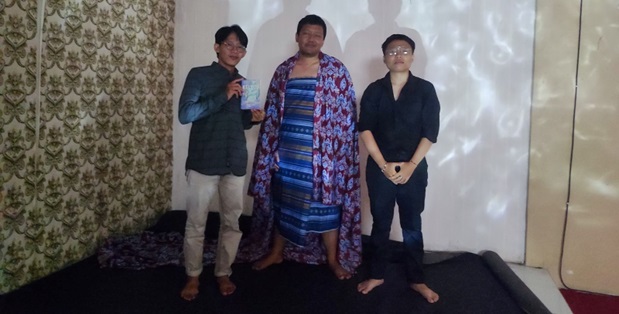By: Napol Riel
A collaborative art performance entitled “Keloid Reflections” was presented virtually by Balad Kawit Seja, Umah Ramah and other young activists at the sixth annual of UCR-QTSR (University of California, Riverside on Queer and Trans Studies in Religion) Conference, on 17-19 February 2024, or 16-18 February 2024 local time. The venue and properties needed for this performance are supported by the Fahmina Institute of Islamic Studies, Umah Ramah, and Balad Kawit Seja (Friends Initiatives).
The “Keloid Reflections” performance is presented using the transmedia method; from the novel “Keloid” (2022) into a combination of poetry, somatic movements and instrumental music. This performance work was initiated by Rhaka Katresna (Balad Kawit Seja activist) who was interested after reading the novel published by Umah Ramah. Immediately, he asked Napol Riel (author of “Keloid” and Umah Ramah activist) to collaborate in presenting the “Cermin Keloid” performance online from the Umah Ramah office in the IDAHOBIT Commemoration by Arus Pelangi last year.
After several months, Rhaka submitted a proposal to present this art performance at the UCR-QTSR conference which was then accepted by the organizers. Apart from Napol, he also invited Lacahya (theater arts activist), Barr (an undergraduate student and literary arts activist), and Leon (music composer, illustrator and comic creator) to collaborate.
In the question and answer session, Rhaka said that Keloid Reflections was created as a form of collective work in an effort to build compassionate awareness towards individuals with various bodily identities; in the context of the novella “Keloid”, namely towards transman individuals. “Keloid” itself tells the true story of the life journey and spiritual encounters of the main character named Jenar as a trans man who was raised in a Muslim household in Indonesia.
Keloid Reflections went through a creative process that quite drained the energy of the fellow activists involved. Before writing poetry together, they first read the book Keloid carefully; reflecting what Jenar experienced with their respective life experiences. The results of the reflection are written in the form of tangents (in the form of expressions, comments, or questions to the author) to be discussed together online. After the reflective discussion, poetry verses were written. Each person poured their ideas into a shared Google document from their homes, which were then compiled into a line of poetry.
The music was composed by Leon based on the mood in the Keloid story. The performers – Rhaka and Lacahya – practiced interpreting the process of their reflection on the experience of Jenar’s life transition – spiritually and bodily – into their respective bodies, through somatic movements following music and the poetry read by Barr.
Two days before the performance, those who will perform gather to synchronize everything into one complete performance; sequence of preparations, stage layout, lighting, sound system, and others. After several rehearsals, Keloid Reflections was successfully presented in front of the UCR-QTSR conference audience who attended both offline and online.
The enthusiasm of the audience was visible in the discussion session after their performance. Several audience members commented appreciating this collective work. The others asked about the creative process and the context behind it. Rhaka and Napol – representing the others – responded to the audience’s reactions one by one joyfully as the message of their performance reached the audience.
Through this process and insights based on the experiences of Rhaka, Barr, Lacahya, and Leon – apart from Napol as the author of Keloid – in co-creating this work, it is true that this work affirms the psychological, spiritual and sexual development of trans men. The hope of this work is that it will inspire more and more collective works to emerge, as well as inclusive discussions that affirm the experiences of individuals with various bodily identities; those whose experiences are often overlooked and misunderstood in society.[]
This article was translated by Napol Riel.
